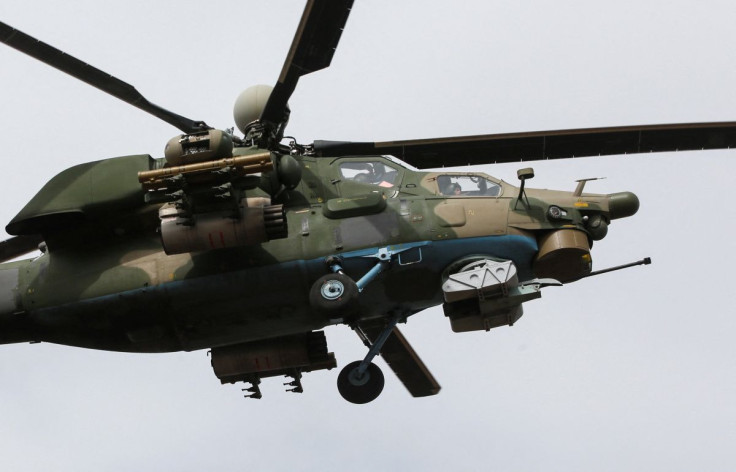Red Cross Heads Again For Mariupol As Russia Shifts Ukraine Focus

A Red Cross convoy will try again to evacuate civilians from the besieged port of Mariupol on Saturday as Russian forces looked to be regrouping for new attacks in southeast Ukraine.
Encircled since the early days of Russia's five-week-old invasion, Mariupol has been Moscow's main target in Ukraine's southeastern region of Donbas. Tens of thousands there are trapped with scant access to food and water.
The International Committee of the Red Cross (ICRC) sent a team on Friday to lead a convoy of about 54 Ukrainian buses and other private vehicles out of the city, but they turned back, saying conditions made it impossible to proceed.
"They will try again on Saturday to facilitate the safe passage of civilians," the ICRC said in a statement. A previous Red Cross evacuation attempt in early March failed.
Russia and Ukraine have agreed to humanitarian corridors during the war that have facilitated the evacuation of thousands of civilians.
The ICRC says its Mariupol operation was approved by both sides, but key logistics were still being worked out.
In an early morning video address, Ukrainian President Volodymyr Zelenskiy warned that Russian troops had moved toward Donbas and the heavily bombarded northeastern city of Kharkiv.
"I hope there may still be solutions for the situation in Mariupol," Zelenskiy said. "The whole world has to react to this humanitarian catastrophe."
In Chuhuiv, a city in Kharkiv province, two young women sat on neighbouring hospital beds, limbs bandaged and pinned in metal braces, survivors of an attack on a bus that they said was carrying around 20 civilians.
Speaking to Reuters Television, Alina Shegurets remembered her own screams, and pointed to her wounded legs and hip.
"Windows started to shake. Then I saw something that looked like holes. Then bullets started to fly above. Powder, smoke... I was screaming and my mouth was full of it," Shegurets said.
The other woman, who identified herself only as Yulia, said eight people died in the attack.
SHIFT FROM KYIV
Russia denies targeting civilians in an invasion that began on Feb. 24 when Russian President Vladimir Putin launched what he called a "special military operation," the biggest attack on a European state since World War Two.
The West calls it an unprovoked war of aggression that has killed thousands, uprooted a quarter of Ukraine's population and brought tensions between Russia and the United States to their worst point since the Cold War.
Facing unprecedented sanctions by Western nations, Russia had threatened to cut off gas supplies to Europe unless buyers paid with roubles. Europe vowed to stay united against Russia's demand, and Moscow said it would not halt supplies until new payments are due later in April.
At peace talks this week, Russia said its war efforts would now focus on Donbas, where it has backed separatists fighting Ukrainian forces since 2014. Russian troops left behind shattered villages and their own abandoned tanks as they moved away from the capital Kyiv.
After failing to capture a single major city, Russia has painted its drawdown of forces near Kyiv as a goodwill gesture in the peace negotiations. Ukraine and its allies say Russian forces have been forced to regroup after suffering heavy losses.
British military intelligence said on Saturday that Ukrainian forces continued to advance against withdrawing enemy forces in the vicinity of Kyiv, and that Russian troops had abandoned Hostomel airport in a northwest suburb of the capital, where there has been fighting since the first day.
The British daily assessment said Ukrainian forces had secured a key route in eastern Kharkiv after heavy fighting.
ODESA TARGETED
In the early hours on Saturday, Russian missiles hit two cities - Poltava and Kremenchuk in central Ukraine, Dmitry Lunin, head of the Poltava region, wrote in an online post. He said infrastructure and residential buildings were hit, but he had no casualty estimates.
Earlier, as sirens sounded across Ukraine before dawn on Saturday, the Ukrainian military reported Russian air strikes on the cities of Sievierodonetsk and Rubizhne in Luhansk. In that eastern region and neighbouring Donetsk, pro-Russian separatists declared breakaway republics that Moscow recognised just before its invasion.
The Ukrainian military also said defenders repulsed multiple attacks in Luhansk and Donetsk on Friday and that Russian units in Luhansk had lost 800 troops in the past week alone. Reuters was unable to verify those claims.
Three Russian missiles fired from Crimea, the southern Ukrainian peninsula annexed by Russia in 2014, struck a residential district of the Black Sea port of Odesa, causing casualties, Odesa's governor, Maksym Marchenko, said on Friday. But officials in Odesa said anti-air defences thwarted an attack on critical infrastructure. Reuters could not immediately verify the account.
United Nations aid chief Martin Griffiths will travel to Moscow on Sunday and then to Kyiv as the U.N. pursues a humanitarian ceasefire, U.N. Secretary-General Antonio Guterres told reporters.
Aiming to lower nuclear tensions with Russia, the U.S. military cancelled an intercontinental ballistic missile test that it had initially aimed only to delay, the Air Force told Reuters.
But the United States and its European allies have sent Ukraine military assistance. Late on Friday, the Pentagon announced an additional $300 million worth, that included laser-guided rocket and anti-drone systems.
Washington will also work with allies to transfer Soviet-made tanks to Ukraine to bolster its defences in Donbas, the New York Times said, citing a U.S. official. The Pentagon declined to comment to Reuters, while the White House did not immediately respond.
© Copyright Thomson Reuters 2024. All rights reserved.





















